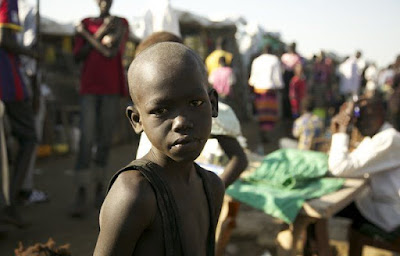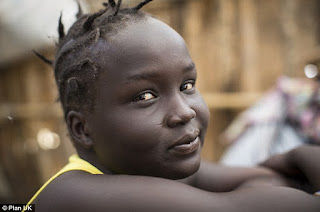Lost Boys
While I was working today, I spoke with a few co-workers about African immigrants coming to America. Many questions were asked, and there were not many that could truly be answered seeing as how a lot of us had little to no knowledge on the subject of modern African communities aside from what can be found on the news.
I asked a question about where modern refugees often go to find asylum in the United states. I specially wanted to know if there were any well known locations were large concentrations of African immigrants could be found in relation to major cities like Newark and San Francisco.
A coworker, vibrantly described a story that she read about in the news years ago. She began talking about "lost Boys" from South Sudan.

After hearing this story, I decided to focus on this topic for my blog post this week. I did some research, and according to BBC.Com, in 2014, "child soldiers" or "lost boys" were still being recutited in South sudan.
The article begins by setting the scene for what became a massive political and social movement around the world. The article explains that it "was a normal school day in May when Stephen and the 80 or so pupils were packed into classroom number 8 in South Sudan"
The student's small school was surrounded by soldiers from "rebel forces." The students in the classroom were taken as young recruits to fight as soldiers in South Sudan's civil war.
According to the article over 11,000 children were apart of the civil war between the ages of 12 to 17 years old. Many of the young boys were beaten and brutalized while others grew sick and died.
Other young men have joined the army simply because they believed that it was "the place to be." Others have joined for employment and because their parents have pushed them into doing so.
According to the article, there are small settlements where many of those who managed to escape from the horrible situations live today. 47,000 were living in settlements established and run by the United Nations.
In 2015, according to Uncefusa.org, 1,775 former child soldiers were released. Unicef hopes to reintegrate them into their community and rive them futures away from the armed forces. Many lost boys were slowly being returned back to their homes and families. Some lost boys have gone on to becomes educators and ministers.
In an article on the New York Times Website, a young man named Duop was returned to his home after six years of displacement. He spent years as a child solider carrying rifles on the front lines of the brutal battle which is affecting South Sudan today. The text explains that, "From numerous accounts pieced together from family members, it seems that Duop quit school around the age of 9, left home, joined a rebel militia, then joined the government army, defected, became a rebel again, was captured, beaten and tortured by government soldiers and then discarded. All this by his 17th birthday, though no one knows precisely when that will be."
Duop was found "badly Beaten" and wondering the side of the road. He was then taken to a "large displaced persons camp" similar to the one mentioned above.
Duop is said to wear rocks in his ears. He is also recorded as being unable to speak or truly communicate with others in the way that he had as a child. The article explains that by wearing the rocks in his ears he "may be trying to keep the voices out."

while the family is photographed as being glad to have Duop back, his relatives told the New York Times that "he is not the same. He's deformed."
Duop is a lucky seeing as how he did make it back to his family, but this is not the case for a lot of child soldiers. This problem is not something that has been resolved, as many people would like to believe. In 2016 alone, Unicef reported that in January over a hundred new child soldiers have been taken to fight in the war.
While it is easy to distance one's self from the problems occurring overseas, particularly because it is no longer being covered in by the mass media, it is still important to learn about these topics.
These young boys should not be forgotten no matter how long this problem has been going on by the rest of the world. It is a current crisis that should still be discussed and talked about in a modern context in order to understand African history and to help the dwindling efforts in South Sudan.

Comments
Post a Comment